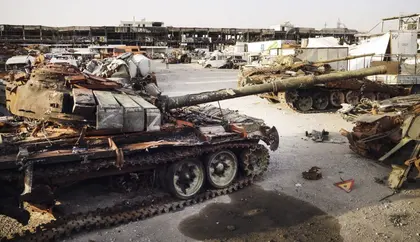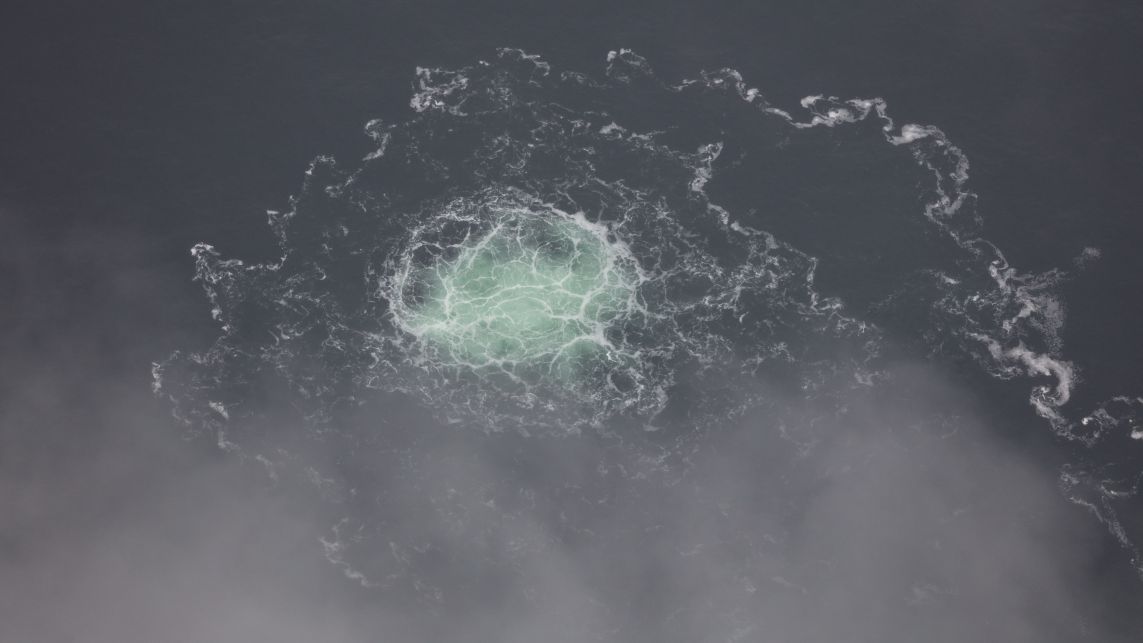One year on from Russia’s brutal invasion of Ukraine, and it’s pretty clear that Russia has lost already so much on so many fronts because of Putin’s idiotic choices.
First, the human cost and, if Ukrainian and Western defense sources are to be believed, upwards of 100,000 Russian soldiers have died, and multiples of this have been injured.
JOIN US ON TELEGRAM
Follow our coverage of the war on the @Kyivpost_official.
Second, it terms of Russian military capability, the same sources indicate that perhaps half of Russian conventional military capability has been destroyed in Ukraine - thousands of tanks, APCs, artillery pieces, scores of aircraft and numerous naval craft, including the flagship of the Black Sea Fleet.
Third, and related to the second point above, the prestige and credibility of the Russian military has been destroyed. Russia had sold itself as a peer competitor with the U.S. and China militarily, but it is now losing to what it would have perceived as a third or fourth rate military power.
Fourth, the perception of Russia as a leader in military technology has suffered a devastating blow. That Russia has failed to provide air defenses for the Moskva or military bases in Crimea, or elsewhere is just staggering. What of the prior fabled capability of Russian S400s which third countries such as Turkey and Egypt had been lining up to buy? Russia military technology has been proven to be decades still behind the West.
Importantly this will cripple demand for Russian military exports, losing the balance of payments billions of now much needed dollars, but also weakening Russia’s ability in sharp power diplomacy. Third countries who are looking to secure military superiority over their regional foes are no longer likely to feel the need to be nice to Moscow, but will need to improve relations with the US and its allies to get access to the now proven best Western military kit. I think we have already seen that with the Pakistan military looking to secure improved relations with the US in order to secure F16 upgrade kits.

Deadly Russian Missiles Contain Foreign Components - Zelensky
Fifth, the Russian economy and elites have been exposed to be utterly corrupt and inept, with corruption in military production and procurement, but also in the intelligence services fatally exposed - from the perished tires on Russian military vehicles to the incorrect intelligence that Ukrainians would welcome Russian invaders with open arms.
Sixth, the economic cost of sanctions has been huge. Russia has lost access to $400bn in frozen assets now in the West. Russian asset prices have collapsed, its elites suffering hundreds of billions of dollars in losses on bonds and equities. Sanctions and war pushed Russia into recession in 2022 and will crimp growth going forward. Access to technology will be constrained. Human and capital flight will limit productivity growth. If the trend growth before the invasion was 2-3% pa, Russia suffered a 2-3% real GDP decline last year, and growth this year and next will be zero to 1% at best. That’s an opportunity cost lost on a $1.7bn economy of $85bn last year, and likely $30-40bn pa going forward.
There is lots of criticism about the fact that sanctions have not collapsed the Russian economy - albeit this was never the intent and sanctions can never be viewed as a silver bullet, but just one tool in the Western armory to weaken Russia’s ability and desire to wage war. But sanctions grind out an impact over the longer term, they weigh down on sanctions targets, limiting its space for maneuver. And this is what is happening to the Russian economy.
And what we know now is Putin long planned this conflict, and I would argue built up Fortress Russia economic policy settings since at least 2014/15 - I was the first to coil the term Fortress Russia back in 2015. This means that Russia had a buffer of $600bn in FX reserves, close to 12% of GDP in the National Welfare Fund and had significantly deleveraged in terms of external and public debt. Russia also was able to play the energy card to great effect over the last year, limiting gas supplies to Europe through last winter, ensuring that upon the invasion energy prices rocketed and bolstered Russian oil related fiscal and trade inflows. This added additional insulation from the Fortress Russia Economy settings built up by Putin.
But sanctions now seems to be impacting on oil and energy prices and as lower gas exports to Europe are all working to slash Russian energy imports and fiscal receipts. The budget deficit is now finally ballooning and the trade account deteriorating. We are seeing higher global energy prices accelerate the energy transition in Europe with demand curtailed.
And it is important to remember here that sanctioned economies function, they survive, but the likes of Iran, North Korea and Venezuela are not very effective or efficient, and their elites tend to rent seek to keep their same sized slice of the cake, which on a smaller cake means that everyone else gets less.
The war in Ukraine has seen so much Russian conventional military equipment destroyed which Putin will need replacing, which will cost the economy and budget huge amounts of resources. The war has kick started an arms race with the West, which the smallish Russian economy will struggle to maintain. Just think NATO and Western allies will be spending 2% of GDP plus on defense now, on a combined $40 trillion GDP, and with the US spending $800bn plus in its own behalf suggest Western defense spending almost equivalent to the size of the entire Russian economy.
Russia cannot compete without making difficult guns versus butter choices, which means likely less social spending and more on defense. Living standards will likely collapse the longer the war goes on and the risks of social unrest in Russia will increase. Either the Putin regime will collapse or it will have to respond with mass repression. This means a vicious cycle of a human capital drain, and weaker potential growth.
One thing to note here is that with hundreds of thousands of Russian soldiers dead or injured now, returning war veterans and their dependents will demand benefits and compensation for their losses. This will add further strain on an already difficult economic and budget financing position. Returning veterans will likely just add to risks to social and political stability and Russia is already seeing a surge in violent crime.
And, meanwhile, arguably now the West has no reason to halt sanctions, but every reason to keep them in place to weaken the Russian economy to reduce Putin’s ability to rebuild the Russian military. This suggests that a long as Putin is in power and waging this war on Ukraine, and the West, that the outlook for the Russian economy will remain grim. Stagnation and decline appear the outlook now for Russia.
Seventh, and in the energy transition, Europe is learning to live without Russian gas and oil. And there is no going back, as Russia has proven itself to be an unreliable supplier of energy to Europe. Putin has cooked the golden goose. Diverting gas to Asia will be difficult as it will require a new pipeline capacity which will take time and financing to deliver. Russia will be hit now with both declining energy production volumes and exports but also lower prices and hence a big hit to revenues. This will likely weigh on the fiscal and BOP positions. Likely it means a weaker ruble, higher inflation, higher policy rates and lower real GDP growth. This again adds to the decline and stagnation scenario outlined above.
Eighth, some have argued that Russia invaded Ukraine because of the fear of NATO enlargement. I absolutely dispute that - and have written extensively therein. But even assuming it was, what has the invasion achieved? Actually instead of less NATO on its border the invasion has driven Sweden and Finland to apply for membership, along with Ukraine - and remember here that Ukraine had little real desire to join NATO prior to the annexation of Crimea, the military intervention in Donbas, and in running for the 2019 election, Zelensky himself was unenthusiastic about NATO membership. Meanwhile, the West and NATO are rearming and putting more military capability up to its borders with Russia, to defend against the now perceived Russian threat. So Putin’s actions have encouraged and are now driving NATO expansion.
Ninth, perhaps most importantly, Putin has lost the hearts and minds of Ukrainians, making its subjugation appear impossible, impractical and now very unlikely. The way he has conducted the war, with no thought for Ukrainian life, even in the East of the country, where Russian speakers have dominated, have made it clear to Ukrainians that Russian rule would wipe out their identity. This is about genocide against the Ukrainian people, and it has united Ukrainians, as perhaps never before, in defense of their identity and the right of the Ukrainian state to exist. For Russia now to occupy and hold Ukraine would take a vast military and financial investment which Russia seems unable to deploy and especially not now with the deployment of Western sanctions on Russia and support for Ukraine.
Putin has actually lost Ukraine forever.
Tenth, and if the Russian goal was to demilitarize Ukraine, then the invasion has achieved exactly the opposite of that. Ukrainians have rallied to their country’s defense, and they have armed themselves, helped by the West’s provision of ever more sophisticated weaponry. Ukraine is now a very capable military power, with a clear cut military doctrine, effective leadership, with highly motivated troops and increasingly effective equipment.
Eleventh, Putin himself has suffered, because of all the above, such a fall from grace. From the arch tactician and the strategic genius as was the common view before the war, to literally now being widely viewed as a genocidal war criminal, international pariah and an idiot responsible for his country’s decline and possible collapse.
Twelve, and because of the above, Russia is itself at risk of regime change. Putin has so weakened Russia that it is now imaginable to think of his forced exit from office. Perhaps still not the base case, but not a black swan event as it might have appeared before the invasion. And it’s possible to imagine Russian defeat in Ukraine seeing a much weaker central state in Russia itself, creating centrifugal forces which were evident in the late 1990s.
The irony if Putin invaded Ukraine with ambitions to create a Greater Russia, but the end game might prove to be a Lesser Russia with new states emerging across the Russian Federation, mimicking events after 1991 and the collapse of the USSR.
Reprinted from @tashecon blog. Read the original here.
The views expressed in this opinion article are the author’s and not necessarily those of Kyiv Post.
You can also highlight the text and press Ctrl + Enter










